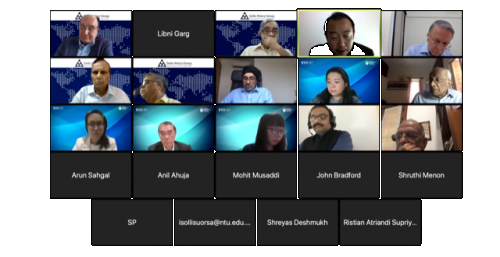3rd DPG-RSIS Annual Workshop
On September 30, 2020 the Delhi Policy Group (DPG) and the S. Rajaratnam School of International Studies (RSIS) organised their 3rd DPG-RSIS Annual Workshop on a virtual platform. The DPG and RSIS delegations were led by Amb. H.K. Singh, Director General and Amb. Ong Keng Yong, Executive Deputy Chairman, respectively. The Workshop was conducted under the Chatham House Rule on three broad themes: Global and Regional Developments; India-ASEAN Connectivity and Economic Cooperation; and Addressing Common Security Challenges. The main trends of discussion are outlined below.
The post-Cold War global order is unravelling. Globalisation and globalism have lost ground, unreformed multilateral institutions remain sclerotic and the inward distribution of US power has added to uncertainties. While India and Singapore are gravitating towards a realist outlook to preserve national interests, discussions stressed the importance of building on existing bilateral trust and friendly relations. The prevailing security challenges in Asia are interconnected: current events in the Himalayas will also affect the maritime space and South East Asia. Similarly, there are inherent linkages between developments in the South China Sea and the Indian Ocean. Speakers referred to China’s ever-expanding core interests and unilateral actions, including diversion of rivers such as the Mekong, that has resulted in decreased water flows to lower riparian countries.
India-ASEAN relations are based on four pillars of partnership: political, security/strategic, economic and people-to-people. The economic pillar remains weak and needs to be strengthened. In that regard, discussions also underlined a shift away from efficiency-based considerations towards security considerations as well as resilience-based supply chain networks. Such a trend is already ongoing and gathering traction.
Discussions stressed the importance of ASEAN centrality for the larger security architecture in the region. While ASEAN centrality may be interpreted differently by its member states, it was observed that South East Asian nations must withstand Beijing’s territorial assertions in the region. The recent strengthening of ASEAN’s position on UNCLOS in determining maritime entitlements and sovereign rights in the South China Sea was welcomed. Further, for ASEAN to be effective, it must be credible and cohesive in its approach to the establishment of a rules-based order in the Indo-Pacific, centred around ASEAN frameworks such as the EAS and ADMM .
Participants stressed that all Quad members have highlighted the importance of ASEAN centrality; the Quad is also essential to a free and open Indo-Pacific and is gaining momentum. The ASEAN Outlook on the Indo-Pacific (AOIP) was welcomed as a step in the right direction.
The need for open and transparent connectivity networks that result in equitable outcomes is becoming increasingly important. India’s long history of implementing connectivity projects in its immediate region was noted, along with the need for enhancing similar projects between India and Southeast Asia.
Given the dynamics of the Indo-Pacific region, participants observed that India’s relationship with ASEAN and specifically Singapore would remain highly consequential for the region’s long-term stability.
DPG and RSIS will hold their 4th Annual Workshop at a mutually convenient date in 2021.



